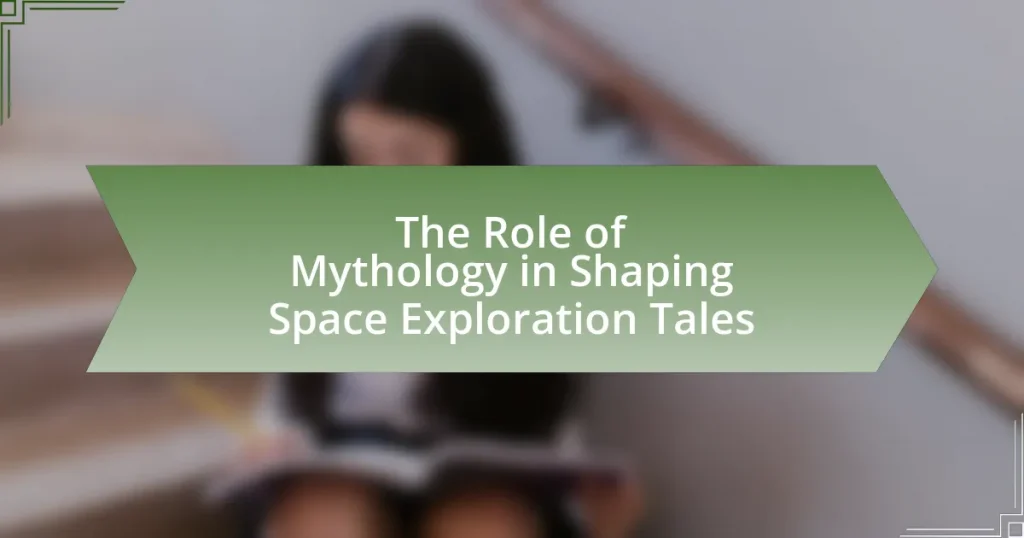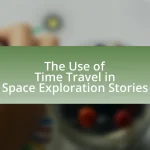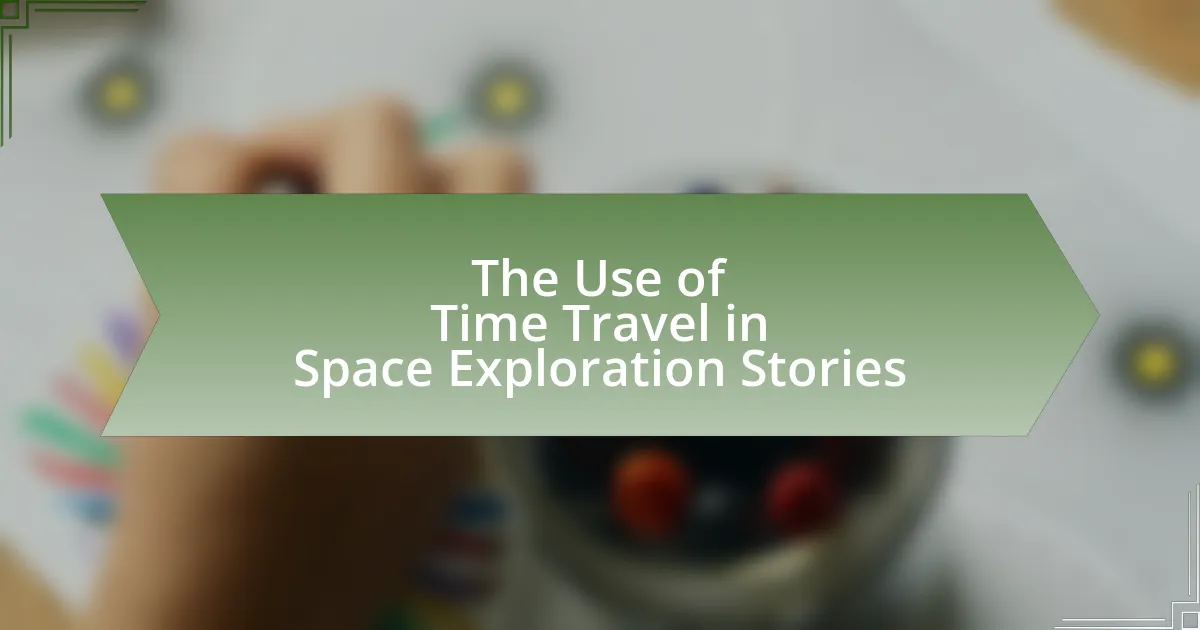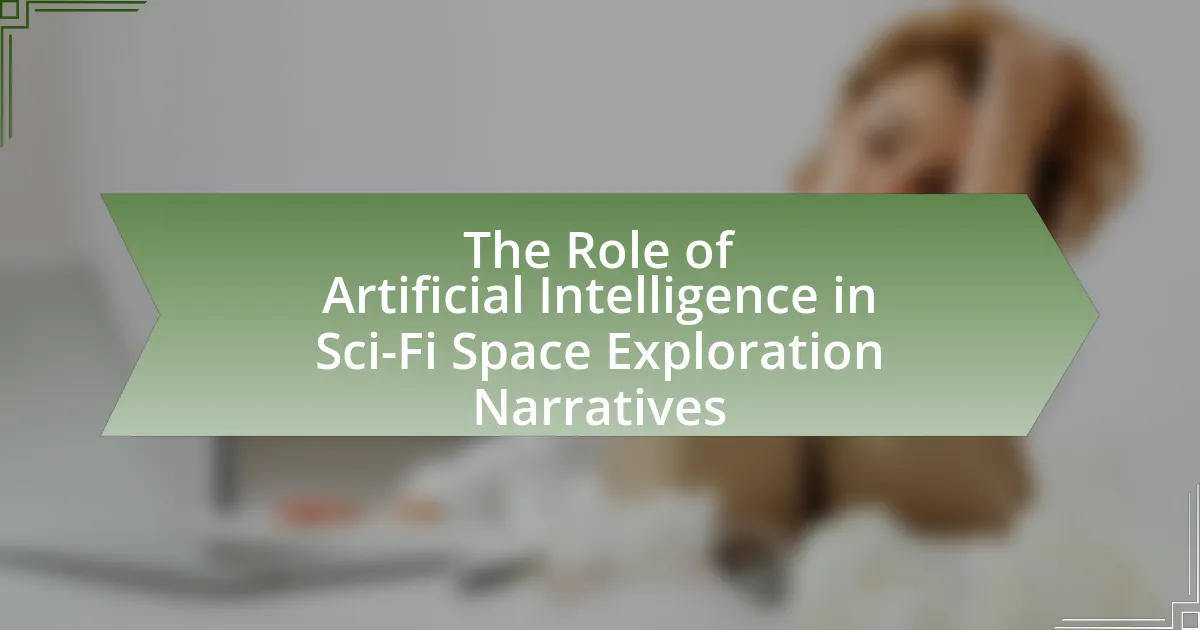The article examines the significant role of mythology in shaping narratives surrounding space exploration. It highlights how mythological themes, such as the hero’s journey and creation myths, resonate with human experiences and aspirations, influencing public perception and storytelling in space missions. Key examples include the Apollo program’s connection to the Greek god Apollo and the use of mythological references in literature and media. The article also discusses the psychological effects of mythology on astronauts and space enthusiasts, the ethical considerations it raises for future exploration, and the potential for new myths to emerge from discoveries in space.
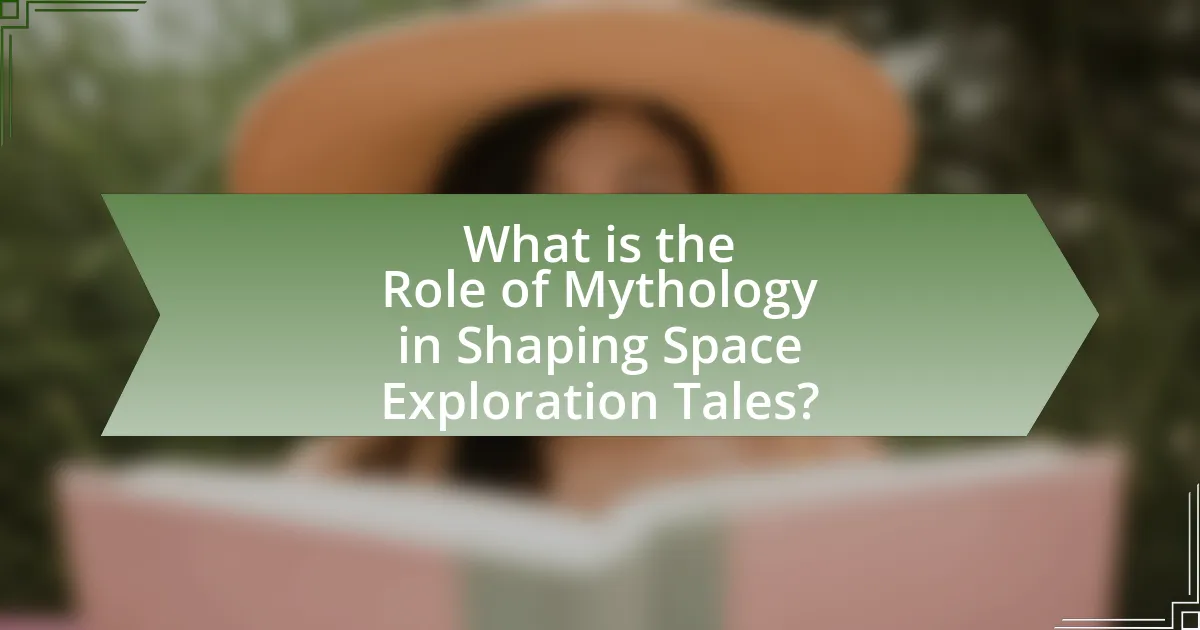
What is the Role of Mythology in Shaping Space Exploration Tales?
Mythology plays a crucial role in shaping space exploration tales by providing archetypal narratives and symbolic frameworks that resonate with human experiences and aspirations. These narratives often draw parallels between ancient myths and modern space missions, illustrating humanity’s quest for knowledge and understanding of the cosmos. For instance, the Apollo missions were frequently likened to the myth of Icarus, symbolizing the ambition and risks associated with reaching for the stars. Additionally, the use of mythological references in literature and media, such as Arthur C. Clarke’s “2001: A Space Odyssey,” reinforces the connection between human mythology and the exploration of outer space, highlighting themes of creation, discovery, and the unknown. This interplay between mythology and space exploration enriches the storytelling, making complex scientific endeavors more relatable and inspiring to the public.
How has mythology influenced the narratives of space exploration?
Mythology has significantly influenced the narratives of space exploration by providing archetypal themes and symbols that resonate with human experiences and aspirations. For instance, the concept of a hero’s journey, prevalent in many mythological stories, parallels the narratives of astronauts venturing into the unknown, as seen in the Apollo missions where astronauts like Neil Armstrong and Buzz Aldrin embodied the archetype of the hero facing challenges and achieving great feats. Additionally, celestial bodies often named after mythological figures, such as Mars (named after the Roman god of war) and Venus (named after the goddess of love), reflect humanity’s longstanding connection between mythology and the cosmos. This connection shapes public perception and storytelling around space exploration, making it not just a scientific endeavor but also a narrative steeped in cultural significance.
What are some key mythological themes present in space exploration stories?
Key mythological themes present in space exploration stories include the hero’s journey, creation myths, and the quest for knowledge. The hero’s journey often mirrors the narrative of astronauts venturing into the unknown, facing trials, and returning transformed, akin to figures like Odysseus or Perseus. Creation myths are reflected in the exploration of new worlds, symbolizing humanity’s desire to understand its origins and place in the universe, similar to the stories of Prometheus or the biblical Genesis. The quest for knowledge theme emphasizes the pursuit of understanding and enlightenment, paralleling mythological quests for wisdom, as seen in tales of figures like Athena or Thoth. These themes resonate with humanity’s intrinsic motivations and fears, making space exploration a modern extension of ancient narratives.
How do these themes resonate with human experiences and aspirations?
Themes in mythology resonate with human experiences and aspirations by reflecting fundamental desires for exploration, understanding, and connection to the cosmos. These narratives often embody the human quest for knowledge and the innate drive to transcend earthly limitations, as seen in myths like Prometheus, who symbolizes the pursuit of enlightenment and innovation. Such stories inspire contemporary space exploration, as evidenced by NASA’s Artemis program, which aims to return humans to the Moon and eventually reach Mars, echoing humanity’s age-old dreams of venturing into the unknown. This connection between mythology and modern aspirations illustrates how ancient narratives continue to shape our vision for the future, reinforcing the idea that exploration is a core aspect of the human experience.
Why is mythology significant in the context of space exploration?
Mythology is significant in the context of space exploration because it provides a framework for understanding the unknown and inspires human curiosity about the cosmos. Throughout history, myths have shaped cultural narratives that connect humanity to the stars, influencing the way societies perceive space and their place within it. For example, ancient civilizations often named celestial bodies after gods and heroes, which not only reflected their beliefs but also motivated exploration and scientific inquiry. The Apollo missions, named after the Greek god of light and knowledge, exemplify how mythology can inspire technological advancements and human achievement in space exploration.
What psychological effects does mythology have on astronauts and space enthusiasts?
Mythology significantly influences the psychological state of astronauts and space enthusiasts by providing a framework for understanding their experiences and aspirations. This influence manifests in enhanced motivation, a sense of purpose, and a deeper connection to the cosmos, as mythological narratives often embody themes of exploration, heroism, and the quest for knowledge. For instance, astronauts frequently draw parallels between their journeys and mythological heroes, which can bolster their resilience and coping mechanisms during challenging missions. Research indicates that engaging with mythological stories can foster a sense of belonging and identity among space enthusiasts, reinforcing their commitment to space exploration. This psychological effect is evident in the way narratives from various cultures, such as the Greek myths of Icarus and Prometheus, resonate with the challenges and triumphs faced in space travel, thereby enriching the emotional and cognitive experiences of those involved in or passionate about space exploration.
How does mythology help in framing the unknown aspects of space?
Mythology helps in framing the unknown aspects of space by providing narratives that contextualize and humanize celestial phenomena. These stories often serve as metaphors for the mysteries of the universe, allowing cultures to interpret and understand the vastness of space through familiar themes such as creation, gods, and cosmic battles. For example, ancient civilizations like the Greeks and Egyptians used myths to explain the movements of celestial bodies, attributing them to the actions of deities, which made the incomprehensible more relatable. This approach not only fosters a sense of connection to the cosmos but also inspires curiosity and exploration, as seen in modern space missions that often reference mythological figures, such as NASA’s Mars rover named Perseverance, echoing the Greek myth of the hero’s journey.
What examples illustrate the connection between mythology and space exploration tales?
Examples illustrating the connection between mythology and space exploration tales include the naming of celestial bodies after mythological figures and the thematic parallels found in space narratives. For instance, the planet Mars is named after the Roman god of war, reflecting humanity’s fascination with conflict and exploration. Additionally, the Apollo space missions drew inspiration from the Greek god Apollo, symbolizing enlightenment and discovery. The narrative of the Voyager spacecraft, which carries the Golden Record, echoes the myth of Odysseus, representing a journey into the unknown. These examples demonstrate how mythology informs the language and symbolism of space exploration, bridging ancient stories with modern scientific endeavors.
Which famous space missions have drawn inspiration from mythological stories?
Famous space missions that have drawn inspiration from mythological stories include NASA’s Apollo program, specifically Apollo 11, which was named after the Greek god Apollo, symbolizing knowledge and enlightenment. Additionally, the European Space Agency’s Rosetta mission is named after the Rosetta Stone, which has mythological significance in understanding ancient languages and cultures. These missions reflect humanity’s connection to mythology, illustrating how ancient stories influence modern exploration endeavors.
How do contemporary films and literature reflect mythological elements in space exploration?
Contemporary films and literature reflect mythological elements in space exploration by incorporating archetypal themes, characters, and narratives that resonate with ancient myths. For instance, films like “Interstellar” and “Gravity” utilize the hero’s journey, a common mythological motif, where protagonists face trials and tribulations in their quest for knowledge and survival, mirroring the epic quests found in mythology. Additionally, literature such as Andy Weir’s “The Martian” draws parallels to mythological figures like Odysseus, showcasing human resilience and ingenuity in the face of overwhelming odds. These works often explore existential questions and the human condition, akin to the moral and philosophical inquiries present in traditional myths, thereby reinforcing the timeless relevance of mythology in understanding humanity’s relationship with the cosmos.
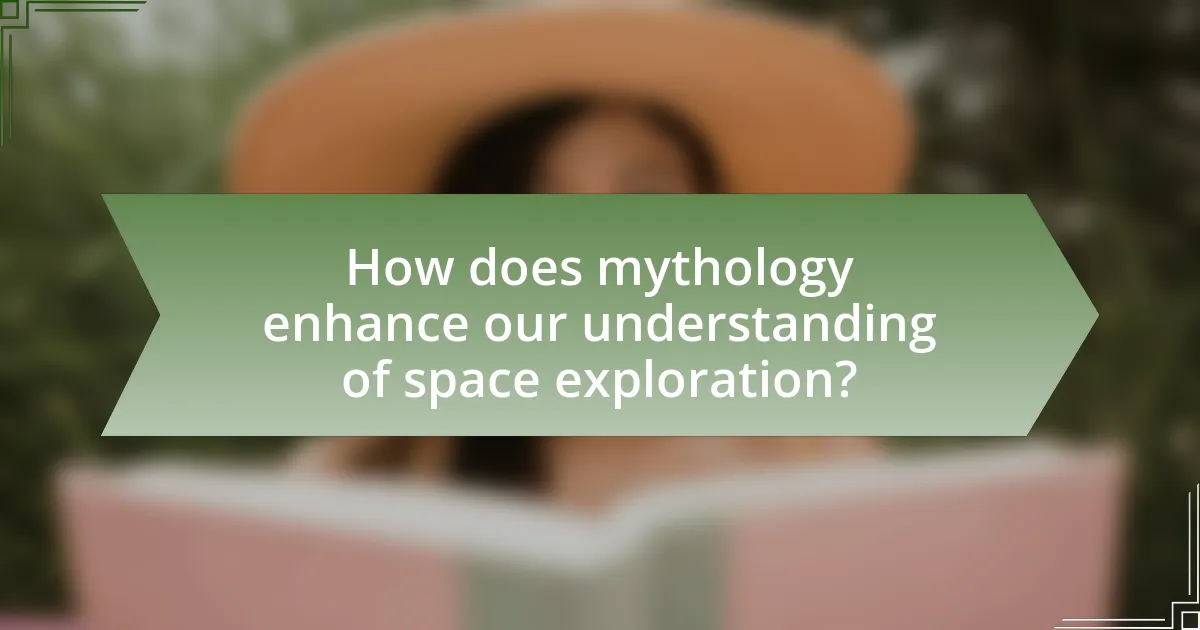
How does mythology enhance our understanding of space exploration?
Mythology enhances our understanding of space exploration by providing a framework for interpreting the unknown and inspiring human curiosity. For instance, ancient myths often depict celestial bodies as deities or significant figures, which can help contextualize modern scientific endeavors in a narrative that resonates with human experience. The stories of gods like Apollo, who represents the sun, or Artemis, associated with the moon, illustrate humanity’s long-standing fascination with the cosmos. This connection between mythology and space exploration is evident in NASA’s naming of missions after mythological figures, such as the Apollo program, which aimed to land humans on the moon. Such references not only honor historical narratives but also evoke a sense of purpose and adventure in contemporary space missions, reinforcing the idea that exploration is a continuation of humanity’s age-old quest for knowledge and understanding of the universe.
What role does storytelling play in the context of space exploration?
Storytelling plays a crucial role in space exploration by framing complex scientific concepts in relatable narratives that inspire public interest and engagement. It transforms technical achievements into compelling human experiences, making the vastness of space more accessible and understandable. For instance, the Apollo missions were not just about landing on the Moon; they were framed as a quest for human achievement and exploration, which captivated global audiences and fostered a sense of unity and purpose. This narrative approach has been essential in garnering support for funding and interest in space programs, as evidenced by the significant public enthusiasm generated during the Mars rover missions, where stories of perseverance and discovery were highlighted.
How do myths serve as a framework for understanding complex scientific concepts?
Myths serve as a framework for understanding complex scientific concepts by providing relatable narratives that simplify intricate ideas. These narratives often embody fundamental human experiences and emotions, making abstract scientific principles more accessible. For instance, the myth of Icarus illustrates the consequences of hubris, paralleling the risks associated with space exploration and technological advancement. This connection helps individuals grasp the ethical and existential implications of scientific endeavors, as seen in the cautionary tales surrounding space missions. By embedding moral lessons within engaging stories, myths facilitate a deeper comprehension of scientific challenges and inspire critical thinking about humanity’s role in the cosmos.
In what ways do myths inspire innovation and creativity in space science?
Myths inspire innovation and creativity in space science by providing archetypal narratives that stimulate imaginative thinking and problem-solving. These narratives often embody themes of exploration, heroism, and the unknown, which resonate with scientists and engineers as they tackle complex challenges in space exploration. For instance, the myth of Icarus, who flew too close to the sun, serves as a cautionary tale about the limits of human ambition and the importance of understanding technology’s boundaries, influencing safety protocols in aerospace engineering. Additionally, the story of Prometheus, who brought fire to humanity, symbolizes the quest for knowledge and innovation, motivating researchers to push the boundaries of scientific discovery. Such myths not only inspire individual creativity but also foster a collective cultural narrative that encourages collaboration and visionary thinking in the field of space science.
How can mythology foster a sense of connection to the cosmos?
Mythology fosters a sense of connection to the cosmos by providing narratives that link human experiences to celestial phenomena. These stories often personify celestial bodies, attributing them with characteristics and emotions that resonate with human life, thereby creating a relatable framework for understanding the universe. For instance, ancient cultures like the Greeks and Egyptians crafted myths that explained the movements of planets and stars, embedding these celestial elements into their cultural identity and daily life. This connection is reinforced by the fact that many myths serve as allegories for human existence, illustrating themes of creation, destruction, and rebirth, which parallel cosmic events. Such narratives not only enrich cultural heritage but also inspire curiosity and exploration, as seen in modern space exploration initiatives that draw on mythological themes to engage the public’s imagination about the cosmos.
What cultural narratives emerge from the intersection of mythology and space exploration?
Cultural narratives that emerge from the intersection of mythology and space exploration often revolve around themes of heroism, creation, and the quest for knowledge. These narratives draw parallels between ancient myths and modern space missions, portraying astronauts as contemporary heroes akin to mythological figures like Odysseus or Icarus. For instance, the Apollo 11 mission is frequently likened to the myth of Prometheus, symbolizing humanity’s quest to reach beyond earthly confines and acquire knowledge. Additionally, the exploration of Mars evokes narratives similar to those found in myths about the gods and their interactions with the cosmos, reflecting humanity’s desire to understand its place in the universe. These connections highlight how mythology continues to influence our understanding of space exploration, framing it as a journey filled with challenges, discoveries, and the potential for transformation.
How do these narratives shape public perception of space missions?
Narratives significantly shape public perception of space missions by framing them within familiar mythological contexts, which enhances relatability and engagement. For instance, the portrayal of astronauts as modern-day heroes echoes archetypal figures from mythology, making their journeys resonate with audiences. This connection can be seen in the way media coverage often emphasizes themes of exploration, sacrifice, and triumph, akin to legendary quests. Research indicates that such storytelling techniques can increase public interest and support for space initiatives, as evidenced by the heightened enthusiasm surrounding missions like Apollo 11, which was framed as a monumental human achievement.
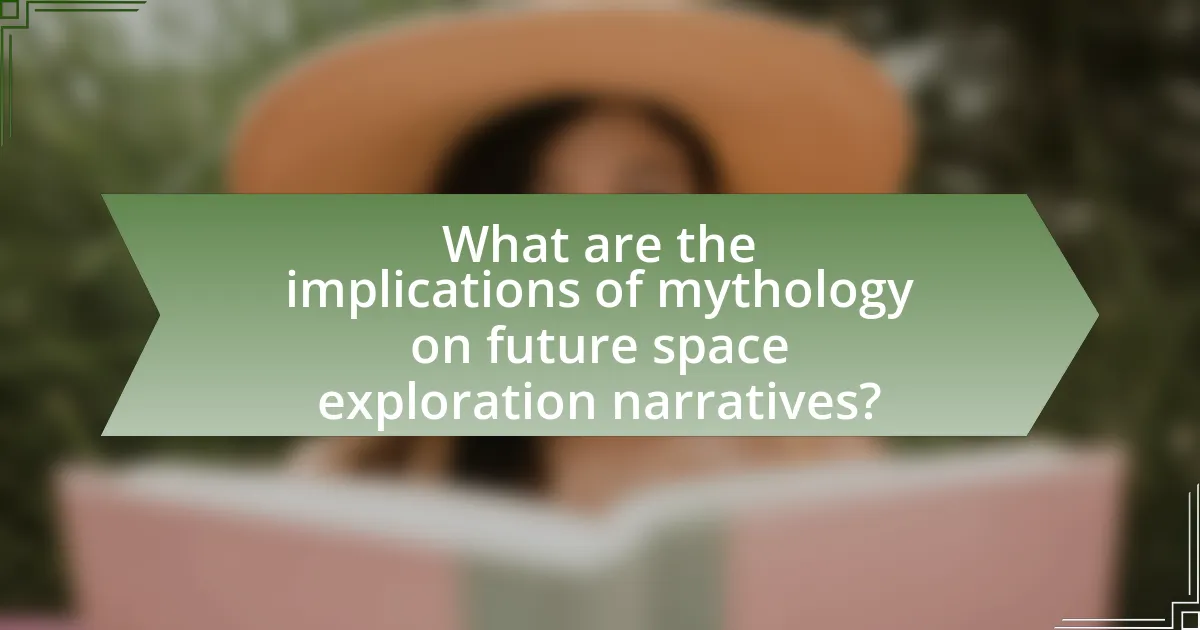
What are the implications of mythology on future space exploration narratives?
Mythology significantly influences future space exploration narratives by providing archetypal themes and cultural frameworks that shape human understanding of the cosmos. These narratives often draw on mythological motifs, such as heroism, creation, and the quest for knowledge, which resonate deeply with human experience and aspirations. For instance, the Apollo missions were framed in a mythological context, invoking the hero’s journey, which helped to inspire public interest and support for space exploration. Additionally, as humanity contemplates colonizing other planets, mythological stories about gods and celestial beings can inform ethical considerations and societal values regarding extraterrestrial life and our responsibilities in the universe. This interplay between mythology and space exploration narratives not only enriches storytelling but also serves as a guide for future exploration, reflecting humanity’s enduring quest for meaning in the vastness of space.
How might future space missions incorporate mythological themes?
Future space missions might incorporate mythological themes by naming spacecraft and missions after mythological figures and stories, thereby creating a narrative that resonates with human culture and history. For instance, missions could be named after gods or heroes from various mythologies, such as Apollo from Greek mythology, which already has historical significance in space exploration. This approach not only honors cultural heritage but also inspires public interest and engagement, as seen in the naming of NASA’s Artemis program, which references the Greek goddess of the moon. By integrating these themes, space agencies can foster a sense of connection between humanity’s past and its future in space exploration.
What potential myths could emerge from new discoveries in space?
New discoveries in space could lead to myths surrounding extraterrestrial life, advanced civilizations, and cosmic phenomena. For instance, the discovery of microbial life on Mars might fuel myths about Martians possessing intelligence or technology, similar to how ancient cultures imagined gods or beings from the heavens. Additionally, the detection of exoplanets in habitable zones could inspire myths about utopian worlds inhabited by perfect beings, reflecting humanity’s desires and fears. Historical examples include the myths surrounding the Moon landing, where conspiracy theories emerged about faked missions, illustrating how new information can be interpreted through a mythological lens.
How can mythology guide ethical considerations in space exploration?
Mythology can guide ethical considerations in space exploration by providing frameworks for understanding human behavior and moral dilemmas. For instance, myths often explore themes of hubris, responsibility, and the consequences of human actions, which can inform decision-making in the context of exploring and potentially colonizing other planets. The story of Prometheus, who stole fire from the gods and faced dire consequences, serves as a cautionary tale about the dangers of overreaching and the ethical implications of technological advancement. This narrative can encourage space explorers to consider the long-term impacts of their actions on both the environment and potential extraterrestrial life. Additionally, myths like those of the Voyager spacecraft, which carry messages to potential extraterrestrial civilizations, highlight the importance of representing humanity ethically and responsibly in the cosmos. These mythological narratives provide valuable insights that can shape ethical frameworks for current and future space exploration endeavors.
What lessons can we learn from mythology for future space endeavors?
Mythology teaches us the importance of storytelling, which can inspire and unify people in future space endeavors. For instance, myths often convey themes of exploration, courage, and the unknown, which can motivate teams and societies to pursue ambitious space missions. The Apollo program drew on mythological narratives, such as the journey of Odysseus, to frame its objectives and inspire public interest. Additionally, mythology emphasizes the significance of collaboration and community, as seen in tales where heroes often rely on allies, mirroring the teamwork required in space exploration. These lessons highlight the need for a shared vision and collective effort in overcoming the challenges of space travel.
How can understanding mythology improve collaboration in international space missions?
Understanding mythology can improve collaboration in international space missions by fostering a shared cultural narrative that enhances teamwork and communication among diverse teams. Mythology often embodies universal themes such as exploration, heroism, and the quest for knowledge, which resonate across different cultures. For instance, the story of Icarus symbolizes the human desire to reach new heights, a sentiment shared by astronauts globally. By referencing these common mythological themes, teams can create a cohesive identity and purpose, facilitating better collaboration. Research indicates that shared narratives can significantly enhance group cohesion and trust, essential elements for the success of complex missions like those in space exploration.
What best practices can be derived from mythological narratives for future explorers?
Best practices derived from mythological narratives for future explorers include embracing the themes of resilience, adaptability, and the importance of collaboration. Mythological stories often depict heroes overcoming insurmountable challenges, which can inspire explorers to persist in the face of adversity. For instance, the tale of Odysseus illustrates the necessity of adaptability and clever problem-solving during unpredictable journeys. Additionally, many myths emphasize the value of teamwork, as seen in the Argonauts’ quest for the Golden Fleece, highlighting that collaboration can lead to success in complex endeavors. These narratives serve as a reminder that exploration requires not only individual courage but also the ability to work together and learn from diverse experiences.
